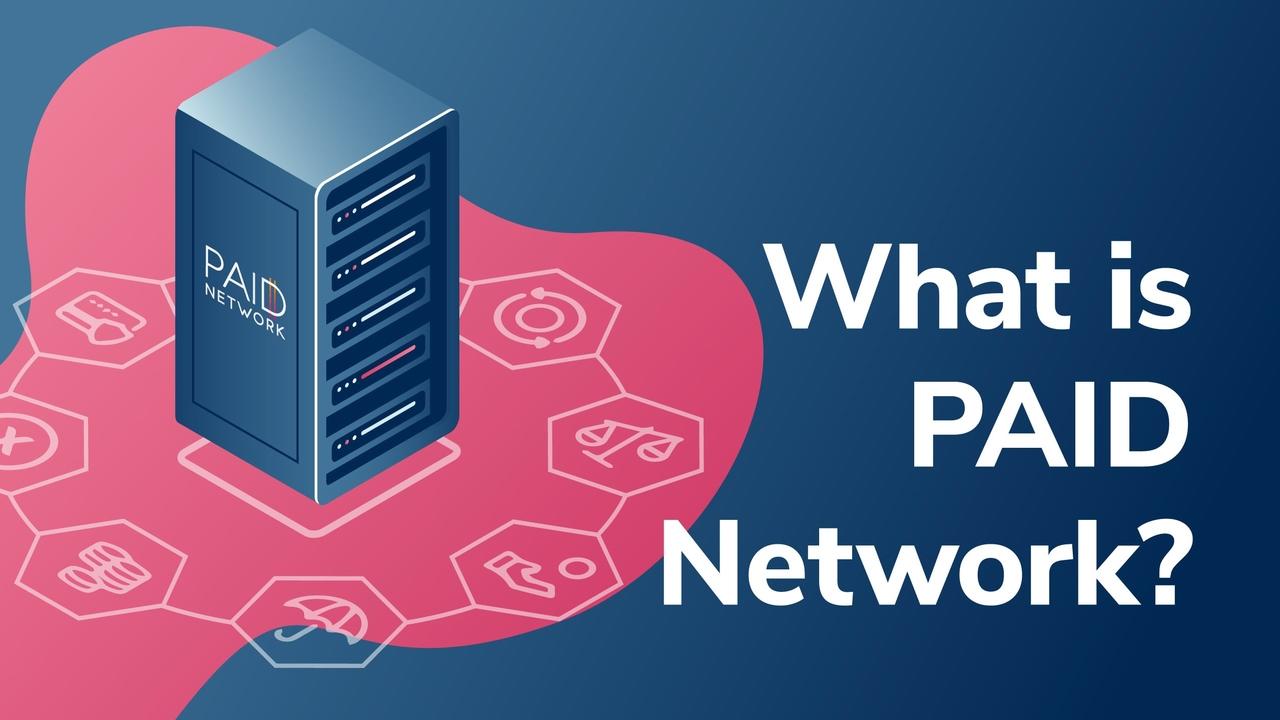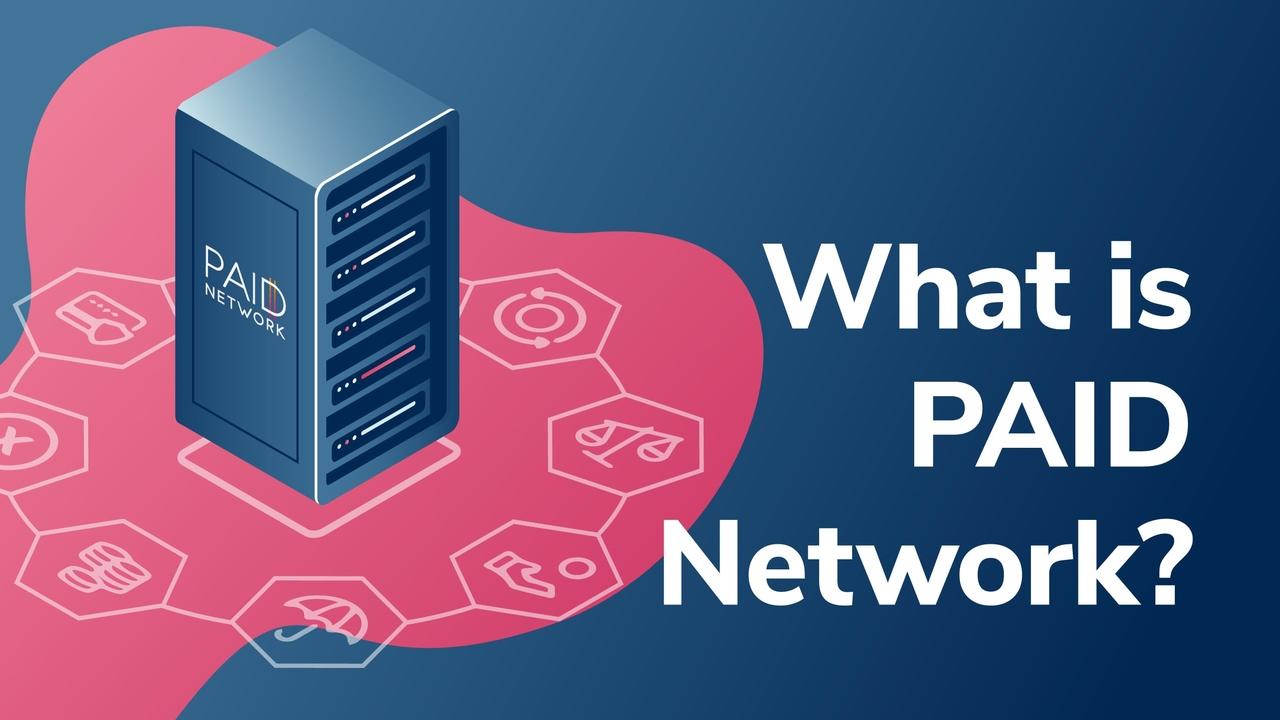
PAID Network (PAID) is a project which aims to provide blockchain-based DeFi-driven legal agreements known as “SMART agreements”. So, why is this needed and what does it mean? To begin with, the current global framework for cross-border settlements is fractured. As such, interoperability between regional legal systems is lacking in many parts of the world, and legal procedures can be drawn out, complex, and expensive. What’s more, systemic inefficiencies of the current legal infrastructure make it difficult for small settlements to be pursued. PAID Network looks to be a simple and easy-to-use alternative to this.
The costs and complexities of cross-border legal proceedings and the uncertainty of the outcome often means that settlements and agreements are deemed not worth pursuing. However, by harnessing the power of blockchain and DeFi, PAID Network is eliminating many of the inefficiencies in cross-border legal settlements. In this article, we’ll explore the PAID Network ecosystem and dive into its core features. We’ll also discuss the benefits of PAID bringing legal settlements onto the blockchain and the advantages of this innovative platform.
PAID Network describes itself as being the “first borderless legal system powered by DeFi on the Polkadot Network”. According to PAID Network, the service will allow companies to streamline business contracts and makes businesses more efficient overall. Blockchain in business is one of the hottest trends in 2020, and is one reason why blockchain education in enterprise is so important. Ivan on Tech Academy allows your enterprise to understand DeFi projects such as PAID Network, learn more about decentralized finance in general, and enroll in world-class blockchain courses. What are you waiting for?
PAID Network & Traditional Legal Services
In the digital age, many aspects of everyday life have become dramatically simpler. However, many industries are still lagging behind. Notably, the legal sector is failing to keep up with a rapidly-changing technological landscape. A lack of consensus and standardization across jurisdictions, coupled with varying legal structures and levels of enforcement makes basic legal settlements problematic when the concerned parties are in different countries.
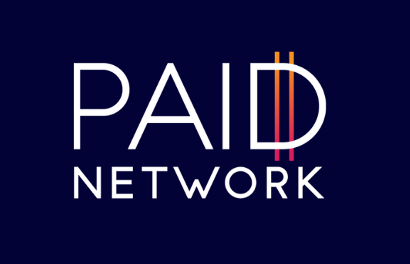
The result of this problem is multi-faceted. Settlements and agreements take longer, costs are higher, and delays are frequent. Additionally, finding the right support and advice to ensure that such agreements are fulfilled compliantly can be difficult. This is particularly the case when either of the concerned parties is large corporations domiciled in protective nations.
PAID Network allows individuals and businesses to save time and money by avoiding ineffective, and costly third parties in the settlement process, while also making the dispute process more secure.
Fundamentally, seeking out legal advice is not as straightforward as it should be. The complexities of creating, implementing, and enforcing legal contracts require specialized knowledge. For those without access to legal advice, this can be a huge detriment.
It’s often a challenge to hunt down several parties across different parts of the world. Even when settlements are agreed upon, it can be troublesome when one party falls short or breaks the agreement. The time and resources involved often make the case not worth pursuing.
The legal process is slow, particularly for smaller cross-border settlements that are often deemed to be low priority. Adhering to the timeline of legal firms and advisors makes for a wholly inefficient and outdated system that is inequitable and due for an overhaul.
What is PAID Network?
The goal for PAID Network is to reduce the commercial civil cases within the traditional judicial system through the use of blockchain technology. With this in mind, PAID is attempting to create the world’s first decentralized legal system. In recent weeks, the project has partnered with Plasm Network, allowing PAID to use the Plasm technology to build interoperable decentralized applications that will be compatible with both the Polkadot and Ethereum blockchains. This collaboration means that using layer 2 scaling solutions, transactions will be processed much faster. Also, transactions will be cheaper and with a higher throughput to a wider audience.
The PAID platform also allows several entities to create and sign bespoke “SMART agreements”, which can be made from templates and adapted to suit the individual needs of users. SMART agreements can be used to hold funds in escrow or to take out insurance in case of a dispute. Issues are arbitrated by the users of the protocol in a transparent and trustless manner. This provides better protection for parties that could be vulnerable to bad actors and malicious intent.
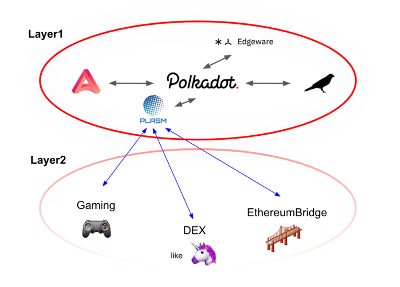
Plasm is designed to be a bridge between the Polkadot and Ethereum ecosystem. Ethereum is the largest blockchain for smart contract development and activity volume. However, it has been known to become congested resulting, in slower transactions with higher fees. This is why PAID Network decided to build on Polkadot, to allow for faster transactions. Thanks to the partnership with Plasm, however, PAID can include and create a dual ecosystem of blockchains.
Chainlink VRF Integration
PAID Network is integrating proof of mathematically verifiably random outcomes on-chain, due to a recent partnership with Chainlink. The number one oracle solution “utilizes verifiable random functions to generate randomness that is verifiable on-chain”.
Transparency alongside cryptographic proof is essential when dealing with the sensitivity of legal cases. Only unbiased, neutral, and just protocols are used on the PAID platform. Chainlink is also infamously blockchain agnostic, a key consideration for PAID Network with plans to operate across both Polkadot and Ethereum ecosystems.
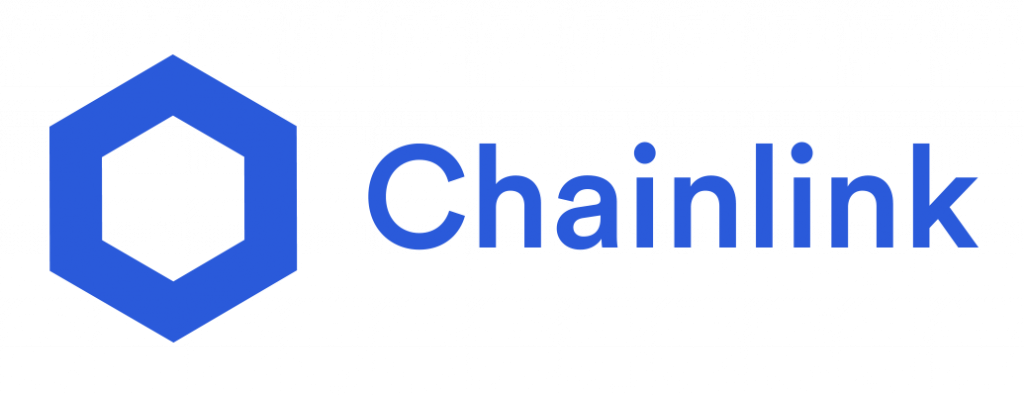
Chainlink is the go-to protocol for a random number generator (alongside oracle use) as it is auditable and verifiable on-chain. This means that all random decisions are mathematically transparent on the blockchain for anyone to see.
Chainlink VRF is being used in the design for a dispute or disagreements protocol. In the very nature of the Smart Agreements and Escrow services offered (explained below), disagreements will arise. PAID Network is preparing for such a situation, with plans to use Chainlink VRF to choose three random Arbitrators, to pass judgment over the case. If a disagreement arises, the Arbitrators will determine the ultimate outcome of the disputed case.
PAID Network has found a transparent solution for determining a fair and random choice from the network of staked Arbitrators. This means that decision-makers are not biased in the situation and cannot put themselves forward. This proves to the case participants, everyone on the network, and public block explorers, there is a cryptographically-secured, decentralized, and fair resolution to a dispute.
Why Do We Need PAID Network?
The global COVID-19 coronavirus pandemic caused most of the world go into lockdown, and made the economy grind to a screeching halt. The speed of reopening the trade, hospitality businesses, and ‘normality’, although slow, still far exceeds the reopening of the legal sector. Court battles and legal advice and approvals are backed up to a concerning amount, with “non-essential, non-emergency” cases taking the brunt of the standstill.
PAID Network is creating services not just for businesses, but individuals too. The cost of attending court, hiring a lawyer and legal advisors, can mount up considerably. Often, for smaller cases, this cost outweighs the benefits of receiving a legal, and moral, resolution.
PAID Network aims to remove the risk of buying assets from malicious actors with trustless over-the-counter (OTC) purchases. Alongside court disputes, PAID Network offers OTC templates for users who would like to trustlessly complete a swap transaction of digital assets. The platform charges only a couple of dollars for the service and can be achieved in a matter of minutes. Conversely, traditional OTC transactions can often involve an intermediary party charging more for their time and services. This usually means only people transacting significant amounts can make it economically viable to facilitate these services. PAID Network removes this entry barrier, allowing anyone to use their services.
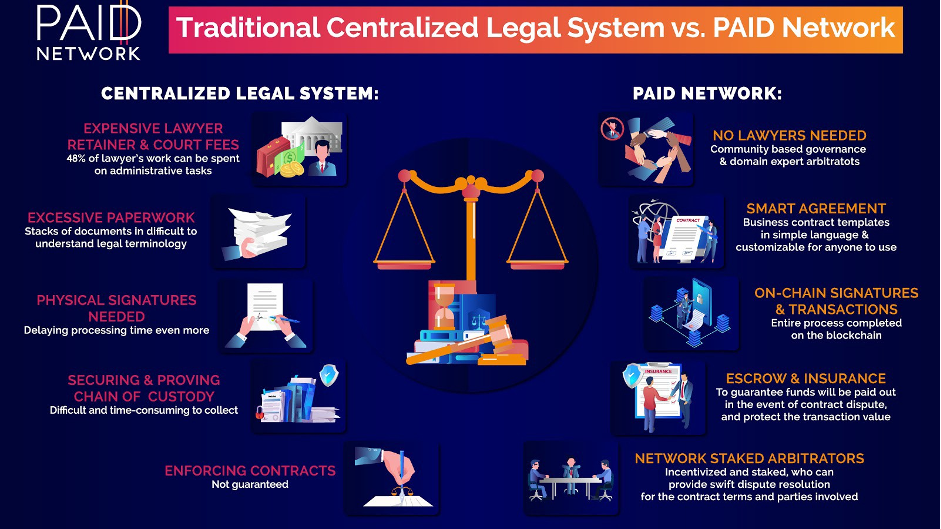
Traditionally, the legal system might not seem like the most natural application of blockchain technology and DeFi solutions. However, this just proves the width of blockchain technology use cases. If you want to learn more about how companies can employ DeFi solutions to streamline or revolutionize existing processes, be sure to take a look at Ivan on Tech Academy. The most important step towards understanding DeFi, blockchain and cryptocurrency is to educate yourself regarding the underlying technology. Join over 30,000 students at one of the most well-known blockchain education platforms today - and get 20% off with the code BLOG20!
How Does PAID Network Work?
PAID Network offers a selection of templates including OTC transactions or disputes, making it easy for users to create an account to use the network. Below we have explained an every-day example as to how and why you may need to use PAID Network.
Joe wants to sell 2 BTC to Simon for $40,000. Joe and Simon don’t know each other, so Joe decides to complete the transaction through PAID Network.
Simple SMART Agreements
Using standardized contracts, Joe creates an account and uses the OTC transaction template, with autofill smart features to complete the details. Joe then manually fills in the amount to be transacted and Simon’s address. The agreement is then sent to Simon.
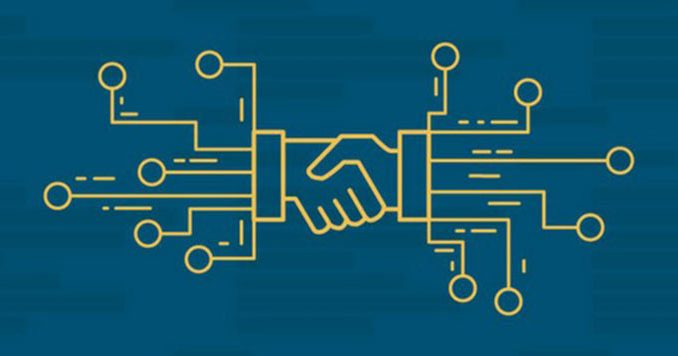
Simon receives the agreement, fills in his details, and signs the agreement. If Simon wants to pay Joe for the 2 BTC using crypto, they will both receive an escrow address to send the assets to. Once the escrow address has received assets from both parties, the assets are automatically released to the respective party.
If Simon preferred to pay Joe through a bank transfer, Simon would simply send the money to Joe’s bank account. Once received, Joe can confirm he has received the money, and the BTC will automatically be sent to Simon. If, however, Joe lies and says he has not received the funds, Simon can then raise a dispute.
Arbitration
The network of Stakers can become Arbitrators in situations of dispute. Using the Chainlink VRF protocol, 3 random Arbitrators can be chosen to vote on which party should receive the assets. As much evidence as possible is sent to the Arbitrators before the vote, such as Simon’s proof of bank transfer. Following this, the Arbitrators will make the final decision on the case, and the escrowed BTC will be released to the party in favor.
Reputation Scoring
After the transaction has been completed, Joe and Simon can then rate each other’s reputation score based on the ease of doing business with them. Reputation scores are public and can be seen by potential buyers/sellers. On top of the cryptographically-secured OTC contracts, users can also be assured through reputation scores whether the person they’re transacting with is trustworthy or not.
PAID Network is helping individuals and businesses alike transact in a fast, secure, and trustless way that has never been possible before. The use of blockchain technology is revolutionizing all industries. PAID Network is giving the analog legal sector an opportunity to step into the digital age.
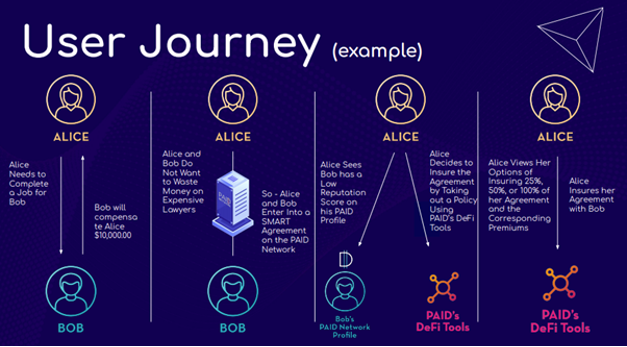
PAID Network Utility Token
The PAID utility token has several functions. One of the ways the token can be used for is for purchasing agreements and subscription service fees. However, the PAID token is also used in DeFi for staking rewards, lending, and insurance. Furthermore, the token is used for reputation and governance through immutable blockchain-based reputation scores, arbitration, and dispute resolution.
“PAID tokens are inflationary in terms of distribution, and deflationary in terms of token burns and staking.”
Token Burning
The PAID Network generates revenue through network transaction fees, lending, insurance, escrow, and arbitration fees, alongside the Smart Agreement platform and products.

25% of the network transaction fees are burned. The remaining fees collectively gathered and distributed: 25% to stakers and 50% to the PAID Treasury.
PAID’s Treasury funds allow for future development and self-sustainability of the project. 50% of funds are dedicated to maintaining standards and requirements are met, ensuring the development of the project can be continuous. 25% of funds are burned to support the value and growth of the PAID token, the remaining 25% is redistributed to stakers (proportionate to the amount staked) as rewards.
If there is a dispute with transactions or reputation scores, random Arbitrators will be chosen to make a deciding vote. The Arbitrators must come forth with their staked funds, as they risk losing these if an unfair or biased vote was to be found. Alongside the risk of losing funds, Arbitrators are incentivized, to be honest by receiving escrow fees.
“PAID tokens will be burned until the total supply of tokens reaches 50% of the initial total supply, 297,358,728 tokens. After five years, the inflationary model of PAID will conclude, becoming a completely deflationary token in a deflationary system.”
DAICO
A Decentralized Autonomous Initial Coin Offering is an improvement of the initial ICO structure that created a bubble in 2017. Shortly after receiving funds, there were many projects where the developers simply took the funds and walked away, without even creating a product. DAICO was proposed by Vitalik Buterin, founder of the Ethereum Network, to use the advantages of the ICO model, without the risk of investors losing their funds.
In short, DAICOs allow investors to participate in the early stages of funding for a start-up. This comes with the option of a refund if they are unhappy with the project’s progress. PAID Network will receive revenue from projects paying fees to access DeFi listings and services moving through a DAICO process. Additionally, community members who stake PAID tokens will receive airdrops and pre-sale opportunities from new start-ups funded through DAICOs.
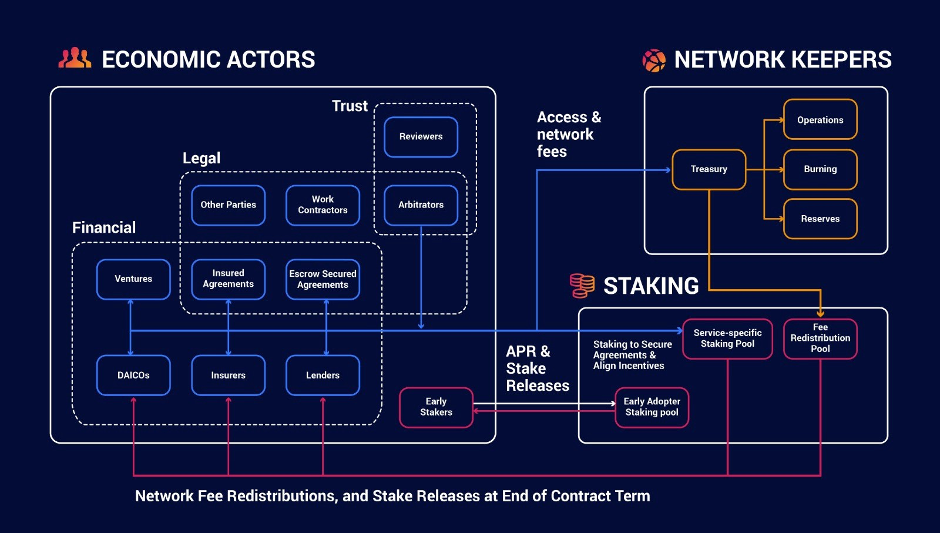
PAID Network Summary
The utility of blockchain technology is expanding beyond what anybody thought imaginable only a decade ago. Decentralized applications and smart contracts are changing how we transact, with new technologies and services emerging in the space almost daily.
PAID Network is creating the world’s first decentralized law network (DeLa) to revolutionize the traditional judicial system. The dApp offers an attorney-free and affordable service for individuals and businesses.
The decentralized legal service resolves disputes fairly and much quicker than the legacy system. With huge savings on legal fees, this allows anyone to resolve unfair disputes with corporations, regardless of geography or wealth, allowing for safe cross-border OTC transactions and international settlements that are resolved trustlessly, and transparently.
Seeing DeFi solutions enter the legal field highlights how DeFi projects can have far-reaching applications. Enroll in Ivan on Tech Academy today to learn more about the blockchain field and various DeFi use cases!
